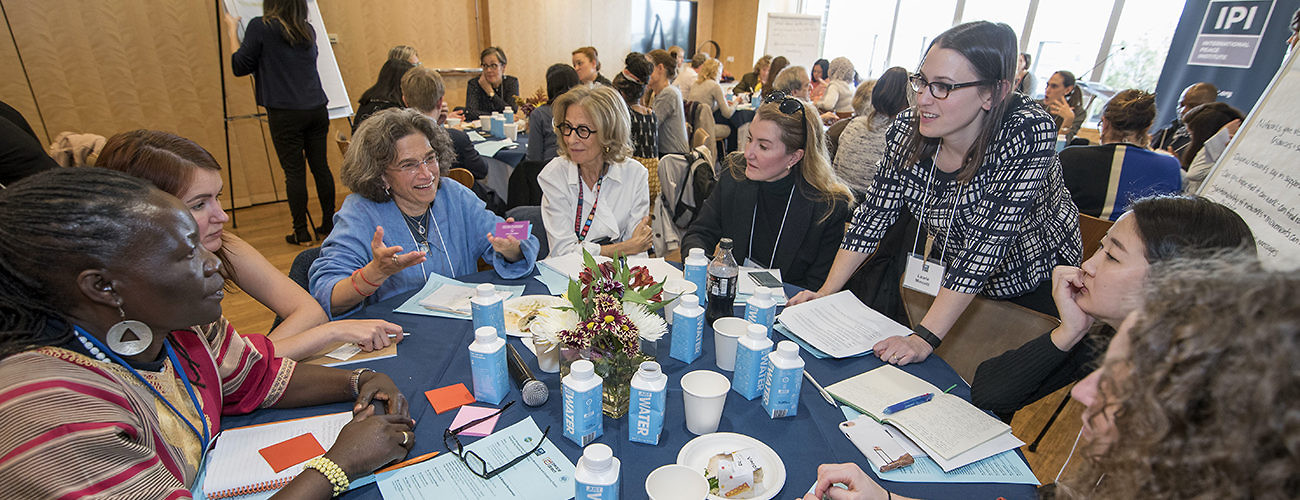The need to meaningfully empower local actors working to build and sustain peace was a central message that came out of an October 22nd IPI event co-hosted with the United States Institute of Peace (USIP), Peace Direct and the Global Partnership for the Prevention of Armed Conflict (GPPAC).
The discussion featured 11 peacebuilders and activists from 10 different countries. Its focus was on what local activists and peacebuilders are doing to sustain and build peace within varying contexts, the challenges they face, and how international actors can best support this work. Connecting the local voices to the global policy debates has been a central role of IPI in 2018, with the aim to create space for meaningful engagement with those who best understand the challenges they face and what solutions are needed.
After introductions from Lesley Connolly, IPI Senior Policy Analyst, Gay Rosenblum-Kumar, New York Representative of Peace Direct, and Maria Stephan, Director of USIP’s Program on Nonviolent Action, participants were seated at six tables. Each table was comprised of activists and peacebuilders from organizations focused on nonviolent action, women-led peacebuilding, and youth-led peacebuilding.
At the tables, participants were asked three rounds of questions, that allowed the grassroots actors to share insights, while encouraging participants to engage in meaningful discussions about some of the unique challenges and strengths of the different kinds of action being discussed. These questions included:
- What are some of the common challenges you face in your work and how do you address them?
- How can international organizations, like the UN, support your work? What would you like to see the UN and the international community do more of? Do less of?
- How does organizing, networking, or movement-building factor into your work, and if so, how? How do you see nonviolent resistance as being part of building peace?
After three rounds, each table shared key takeaways from their unique discussions that covered a wide range of topics pertinent to building and sustaining peace in New York, Washington DC, and in the field. As efforts to advance the policy frameworks of sustaining peace, prevention, and the Sustainable Development Goals (SDGs) continue to dominate discussions at the United Nations, it is vital that they allow space for local actors to share what works and what is needed to truly contribute to sustaining peace. Linking the knowledge and reality from the ground to policy discussions in New York and DC can strengthen efforts to prevent and mitigate violence and build a just peace globally.
There were three main messages raised at this meeting:
First, participants voiced the need for more flexible and sustainable funding that can be accessed by smaller civil society organizations on the ground. Currently, it is difficult for local actors to access or absorb large grants from international institutions and navigate the bureaucratic and administrative hurdles to meet the proposal requirements. At times, local peacebuilding organizations cannot publicize their activities and cannot list event participants for security reasons. We need to move away from the narrative that grassroots organizations are disorganized and better recognize the constraints at play. We should also recognize that locally-led protests and other forums of nonviolent collective action that challenge the status quo are often necessary to address injustices and advance sustainable peace.
On a related note, participants highlighted that more support should be allocated to capacity building. This capacity building should not simply focus on ensuring that civil society in the field can absorb funds effectively, but it should also foster sharing of skills and lessons-learned among grassroots activist and peacebuilder networks within countries across borders.
Second, local peacebuilders working in both youth-led peacebuilding and women-led peacebuilding stressed the need for more space for their voices and work to feed into decision and policy-making at all levels. The local actors—those most directly affected by violence—are the ones who know the solutions to the challenges faced. There is a need for more space for engagement with local actors, especially those on the periphery of decision-making processes. The need for meaningful participation of women in peace processes, dialogues, and peacebuilding efforts is vital to ensuring just, inclusive, and sustainable peace. In addition, UN agencies and departments should operationalize recommendations in the reports of the Advisory Group of Experts Review of the UN’s Peacebuilding Review and the High Level Independent Panel on Peace Operations (HIPPO) to strengthen youth’s and women’s voices both at headquarters and in the field to ensure that these perspectives are integrated at all levels of peacebuilding work.
Lastly, participants stressed the need for greater support and cooperation with regional organizations, as well as civil society across regions. Sharing lessons-learned and networking across countries can help activists and peacebuilders identify new ideas for navigating challenges, building community resilience and empowering voices, especially as space for civil society continues to shrink globally. In addition, working with regional organizations can ensure that approaches will be more contextualized and make it easier to find consensus among populations most affected by violence.
The event successfully created a space for local activists and peacebuilders to share what is truly needed to support local efforts to build peace and promote nonviolent action within the global policy community. As the UN Peacebuilding and Sustaining Peace Resolutions state, the grassroots local actors should be the starting point for all our work, and it is vital we learn from them, empower them, and support them. Without investing in strengthening local peace capacities, even the most aspirational declarations at the UN and in capitals around the world will fail.








